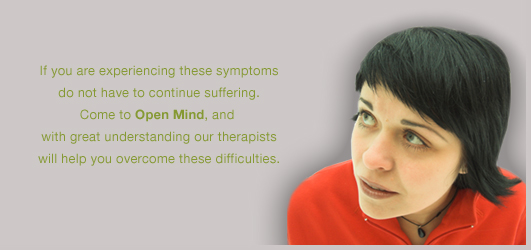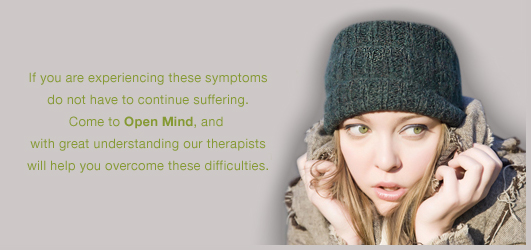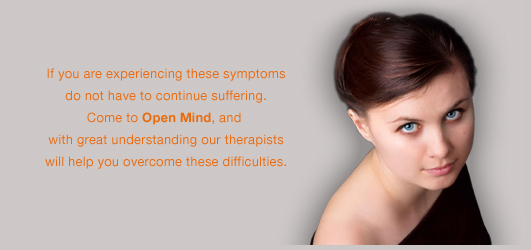Anxiety Disorders
- Generalized Anxiety Disorder (GAD)
- Panic Attack
- Obsessive Compulsive Disorder (OCD)
- Post Traumatic Stress Disorder (PTSD)
- Social Phobia
- Specific Phobia
Generalized Anxiety Disorder SELF-EVALUATION CHECKLIST
Do you currently suffer, or have you recently suffered from, the following?
- Anxiety and/or worry about a number of events, such as work, financial matters, school performance, etc.
- Difficulty in controlling the worry
- Restlessness, feeling keyed up or on edge
- Being easily fatigued
- Difficulty concentrating, mind going blank
- Irritability
- Muscle tension
- Restless sleeps or difficulty falling or staying asleep
If you answered YES to three or more of the above, you may be suffering from generalized anxiety. (There are also more specific forms of anxiety, such as social phobia and panic).
What else could go wrong?
You are not the only one who regularly has one of "those days."
Anxiety disorders are the most common mental health issue in the US. 1 in 5 Americans struggle with anxiety Individuals suffering from anxiety are 3-5 times more likely to go to the doctor, as anxiety often mimics physical illness People with generalized anxiety disorder (GAD) go through the day filled with exaggerated worry and tension, even though here is little or nothing to provoke it.
They anticipate disaster and are overly concerned about health issues, money, family problems, or difficulties at work. Sometimes just the thought of getting through the day produces anxiety.

Panic Attack
Do you suffer any of the following?
- Sweating
- Rapid heartbeat
- Nausea, stomach cramps
- Shortness or breath, feeling of smothering
- Chest pain
- Numbness
- Feelings of disconnection or unreality
- Hot or cold flashes
- Fear of dying, losing control or going crazy
- Trembling or shaking
- Feeling of choking
- Dizziness or lightheadedness
- Feeling detached from oneself (depersonalization)
If you have experienced four or more of these symptoms during a relatively brief time (less than 10 minutes), you may have had a panic attack.
If such attacks recur, especially if accompanied by a dread of situations, which may trigger another episode, you may be suffering from a panic disorder.

Obsessive Compulsive Disorder

For example, if people are obsessed with germs or dirt, they may develop a compulsion to wash their hands over and over again.
If they develop an obsession with intruders, they may lock and re lock their doors many times before going to bed.
Being afraid of social embarrassment may prompt people with OCD to comb their hair compulsively in front of a mirror-sometimes they get “caught” in the mirror and can’t move away from it.
Performing such rituals is not pleasurable. At best, it produces temporary relief from the anxiety created by obsessive thoughts. Most of the time, the rituals end up controlling them. If you are experiencing these symptoms do not have to continue suffering.
Come to Open Mind, and with great understanding our therapists will help you overcome these difficulties.
Post Traumatic Stress Disorder
Post-traumatic stress disorder (PTSD) develops after a terrifying ordeal that involved physical harm or the threat of physical harm.
The person who develops PTSD may have been the one who was harmed, the harm may have happened to a loved one, or the person may have witnessed a harmful event that happened to loved ones or strangers. PTSD was first brought to public attention in relation to war veterans, but it can result from a variety of traumatic incidents, such as mugging, rape, torture, being kidnapped or held captive, child abuse, car accidents, train wrecks, plane crashes, bombings, or natural disasters such as floods or earthquakes.
People with PTSD may startle easily, become emotionally numb (especially in relation to people with whom they used to be close), lose interest in things they used to enjoy, have trouble feeling affectionate, be irritable, become more aggressive, or even become violent. They avoid situations that remind them of the original incident, and anniversaries of the incident are often very difficult.
PTSD symptoms seem to be worse if another person, as in a mugging or a kidnapping, deliberately initiated the event that triggered them. Most people with PTSD repeatedly relive the trauma in their thoughts during the day and in nightmares when they sleep.
These are called flashbacks. Flashbacks may consist of images, sounds, smells, or feelings, and are often triggered by ordinary occurrences, such as a door slamming or a car backfiring on the street. A person having a flashback may lose touch with reality and believe that the traumatic incident is happening all over again.

Social Phobia
Do you currently suffer, or have you recently suffered from, the following:
- Fear of social situations in which others expose you to unfamiliar people or possible scrutiny.
- In social situations fear you will act in a way (or show anxiety symptoms) that will cause embarrassment.
- Exposure to feared social situation provokes anxiety and/or panic.
- You recognize your social fear to be excessive or unreasonable.
- Avoidance or dread of feared social situation.
- Fear of social or performance situations interferes with your normal routine If you experience several of the above, you may be suffering from social anxiety, also called social phobia.
Social phobia, also called social anxiety disorder, is diagnosed when people become overwhelmingly anxious and excessively self-conscious in everyday social situations. People with social phobia have an intense, persistent, and chronic fear of being watched and judged by others and of doing things that will embarrass them.
They can worry for days or weeks before a dreaded situation. This fear may become so severe that it interferes with work, school, and other ordinary activities, and can make it hard to make and keep friends.

Specific Phobia
Specific phobia is an intense fear of something that poses little or no actual danger.
Some of the more common specific phobias are centered around closed-in places, heights, escalators, tunnels, highway driving, water, flying, dogs, and injuries involving blood. Such phobias aren’t just extreme fear; they are irrational fear of a particular thing.
You may be able to ski the world’s tallest mountains with ease but be unable to go above the 5th floor of an office building.
While adults with phobias realize that these fears are irrational, they often find that facing, or even thinking about facing, the feared object or situation brings on a panic attack or severe anxiety.



